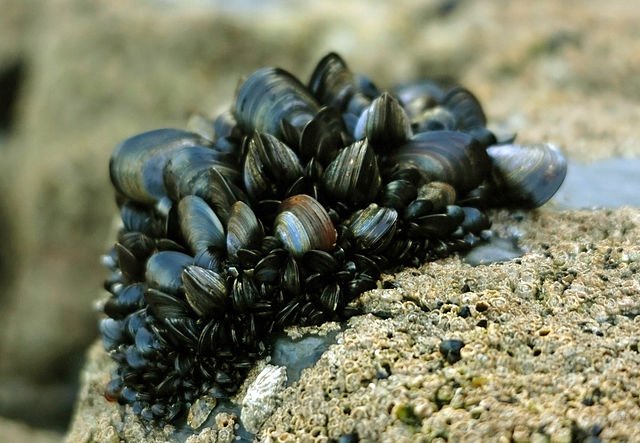Blue mussels learn to avoid parasites
Blue mussels adapt their behaviour when parasitic larvae are nearby, according to research by Christian Selbach and colleagues.
During food intake, blue mussels, Mytilus edulis, run a risk. The bivalve molluscs feed by filtering water. It enters through an inlet and flows over gills, which not only take oxygen from the water, but also food particles, mainly plankton. These particles get stuck on a mucous layer and are transported to the stomach. The water exits through an outflow opening.
With the inflow of water, mussels may ingest larvae of a harmful parasite.
Mussels that encountered the parasite before, have learned to be more careful. If they notice the presence of parasites in the water, they close their valves and stop filtering to avoid further infection, Christian Selbach and colleagues show.
Intermediate host
The parasite, the fluke (or trematode) Himasthla elongata, has a complicated life cycle in which mussels are indispensable. The cycle starts in a bird that lives near or at sea, such as an oystercatcher, common eider, or scoter; in these animals, adult parasites thrive. They mate and produce eggs that end up in the water with the bird’s faeces. The eggs hatch and the larvae, so-called miracidia, are eaten by common periwinkles; the small snails are the first intermediate host.
In the snails, the parasites develop into the next larval stage, the cercariae, which also end up in the seawater. These are the larvae that infect filtering mussels, which are the second intermediate host. Mussels live in the tidal zone, near the coast, where they can form large shell reefs.
After ingestion by mussels, the parasitic larvae form cysts, a resting stage. Infected mussels grow poorly and are vulnerable to predation by oystercatcher, eider or scoter. And that completes the circle: those birds are the primary host. Once a bird has eaten infected mussels, the parasites mature, and the story starts all over again.
Shut off
If infective larvae are present in the water, mussels cannot help ingesting them when filtering. The only thing they can do to avoid infection is to stop taking in water. But that has a price, because it also means that they cannot take in oxygen and food.
Yet they stop, according to Selbach’s experiments in which he exposed mussels to infective larvae. But they have to learn it.
Mussels that have no previous experience with the parasites go on filtering when they are exposed to larvae. But mussels that met the parasite before and got infected, now shut themselves off. They reduce filtration activity and close the valves with the adductor muscles, which costs energy. But apparently, it would be worse to ingest another dose of parasitic larvae.
Now, it would be interesting to find out how the mussels notice that there are infective larvae around; that is still unclear.
Willy van Strien
Photo: blue mussel. Inductiveload (Wikimedia Commons, public domain)
Source:
Selbach, C., L. Marchant & K.N. Mouritsen, 2022. Mussel memory: can bivalves learn to fear parasites? Royal Society Open Science 9: 211774. Doi: 10.1098/rsos.211774
